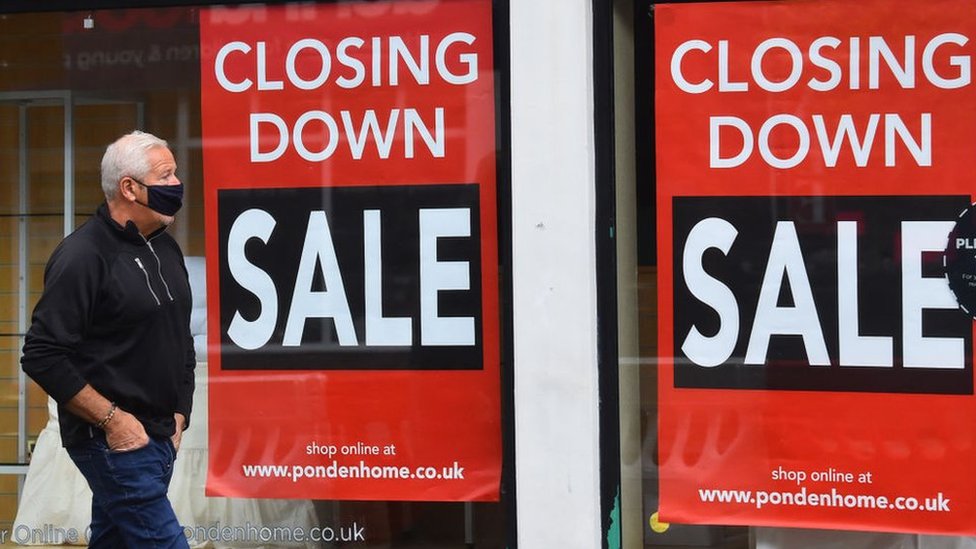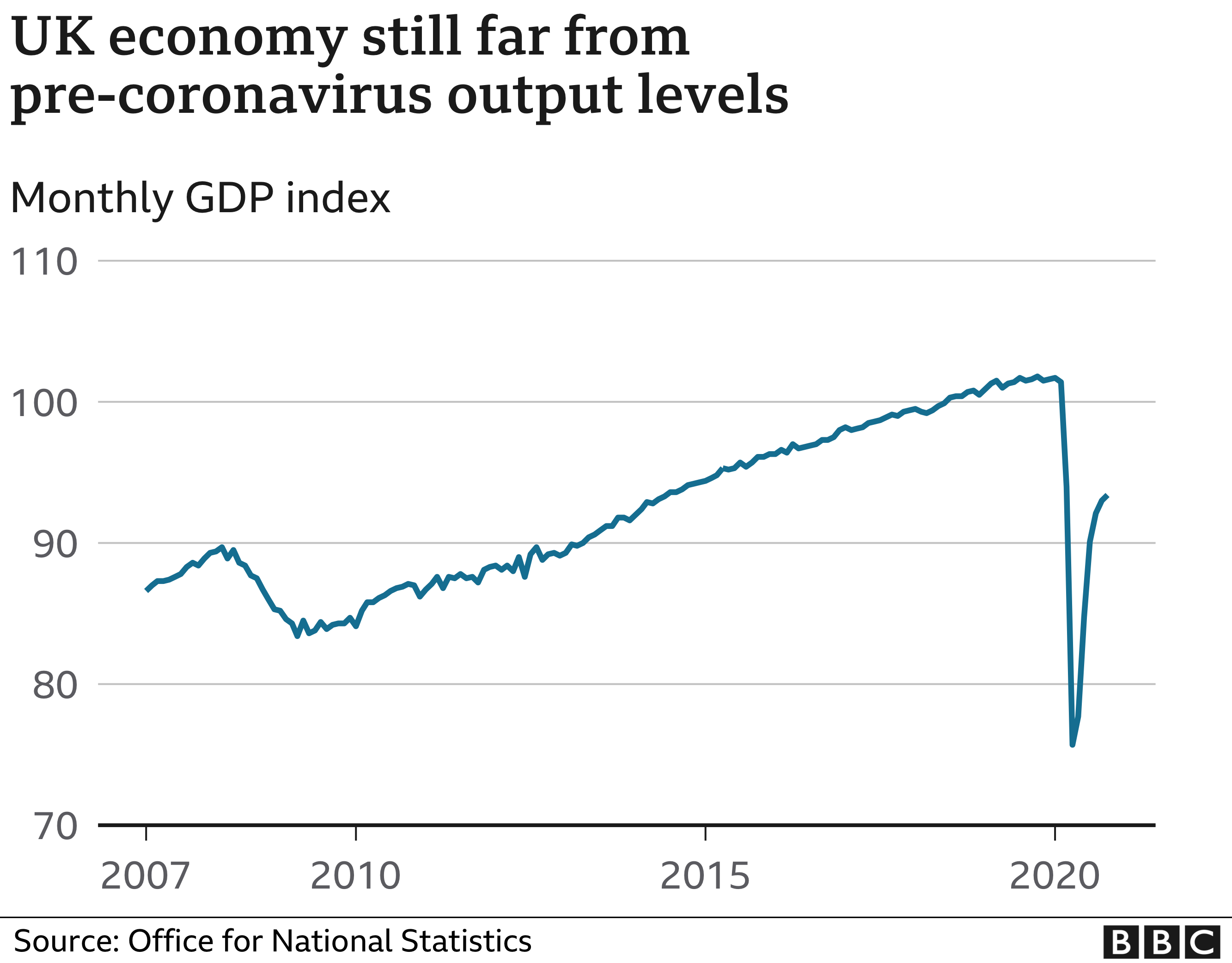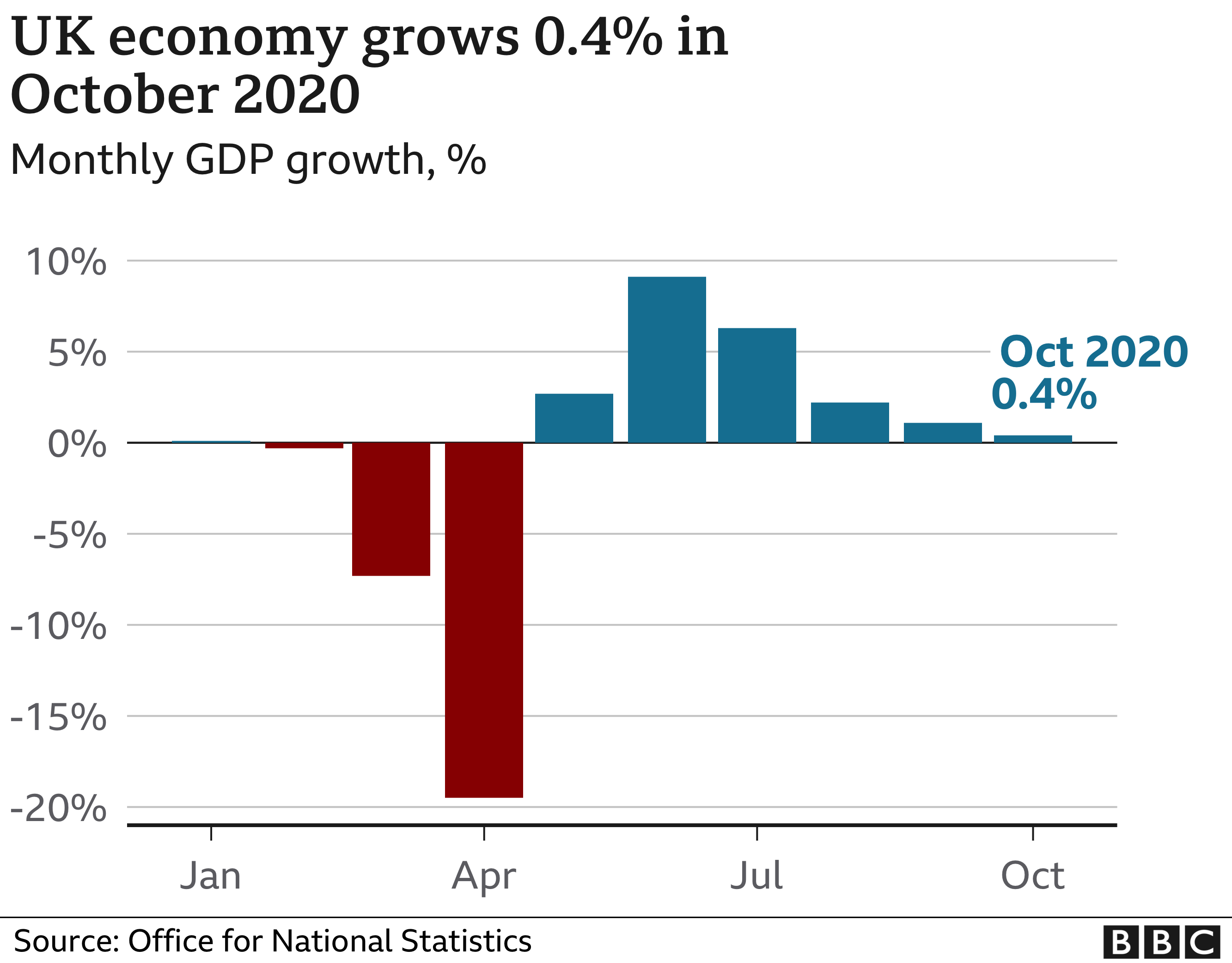
The UK economy grew by just 0.4% in October as the recovery continued to slow.
The economy remains well below the size it was before the pandemic began, the Office for National Statistics (ONS) said.
The UK has been recovering from a record slump earlier this year induced by the first coronavirus lockdown.
But output is expected to shrink again in November after England's second shutdown forced firms to close.
The ONS said there had been some areas of growth during October but the UK economy "still remains around 8% below its pre-pandemic peak".

"Public services output increased, while car manufacturing continued to recover and retail again grew strongly," said ONS deputy national statistician Jonathan Athow.
"However, the reintroduction of some restrictions saw services growth hit, with large falls in hospitality, meaning the economy overall grew only modestly."
October was the sixth consecutive month of growth for the UK after the economy contracted by a record 19.5% in April amid the first lockdown.
The economy initially rebounded at a record rate, and grew by 10.2% in the August to October period compared with the previous three months.
But growth has begun to slow - slipping from 1.1% in September - and the economy remains fragile, with unemployment continuing to surge.

The ONS said the services sector was the hardest hit in October, with growth almost grinding to a halt as pubs and restaurants were hit by the 10pm curfew and tighter restrictions.
Much of England remains subject to such curbs, which is likely to drag on growth into the new year, said the British Chambers of Commerce.
"October's slowdown is likely to be followed by a significant contraction in economic activity in November as the effects of the second coronavirus lockdown are felt, despite the prospect of a temporary boost from Brexit stockpiling," said head of economics Suren Thiru.
"While a vaccine offers real hope, failure to avoid a disorderly end to the [Brexit] transition period or further lockdown restrictions before a mass vaccine rollout is achieved would severely drag on any economic recovery."

What is GDP?
Gross domestic product (GDP) is the sum (measured in pounds) of the value of goods and services produced in the economy.
But the measurement most people focus on is the percentage change - the growth of the country's economy over a period of time, typically a quarter (three months) or a year.
If the GDP measure is up on the previous three months, the economy is growing. That generally means more wealth and more new jobs.
If it is negative, the economy is shrinking.

Official forecasts predict the UK economy will shrink by 11.3% this year - the biggest decline in 300 years.
The Office for Budgetary Responsibility (OBR), the government's independent forecaster, expects the economy will not return to its pre-crisis size until the end of 2022.
Yael Selfin, chief economist at KPMG UK, said the recovery could take even longer if the UK fails to strike a Brexit deal by 31 December.
The UK and EU have so far failed to break the deadlock in talks and Foreign Secretary Dominic Raab said it was "unlikely" the negotiations would be extended beyond Sunday.
"GDP could rise by 6.1% next year in the event we get a Brexit deal, while growth could prove lower at 3.3% if there is no deal with a small recession at the start of the year," said Ms Selfin.
The government has extended the furlough wage support until the end of March in a bid to avert a jobs crisis, but unemployment is still expected to rise to 2.6 million - or 7.5% - by mid-next year.
Commenting on the October figures, Chancellor Rishi Sunak said: "I know people are worried about the winter months, but we will continue to support people through our Plan for Jobs to ensure nobody is left without hope or opportunity."

A terrifying bungee jump

Growth in economic activity of 0.4% in a month wouldn't be bad in another context; if repeated every month that would mean stellar annual growth (such as we haven't seen in decades) of 4.8%.
But we have to remember, the economy this year has done a terrifying bungee jump. After plummeting in the spring, it's bounced since May. In the autumn the bungee chord was slackening.
While manufacturing grew in October, services were up just 0.2% - with more activity in sectors such as healthcare offset by accommodation and food, where hotels and restaurants were struggling with the tiering system and 10pm closing.
A huge 79% of businesses in that sector reported worse business than last year and in the hardest hit sectors - the travel sector and creative arts and entertainment - business was still less than half its pre-pandemic level.
And that's before the renewed lockdown of November in England that is set to cause the UK economy to shrink again.
Business lobby group the CBI is now forecasting the economy won't get back to pre-pandemic levels of activity until the end of 2022 - echoing the official OBR projections, which also anticipate that if there's a no-deal Brexit, the economy won't recover fully until 2024.

https://news.google.com/__i/rss/rd/articles/CBMiLGh0dHBzOi8vd3d3LmJiYy5jby51ay9uZXdzL2J1c2luZXNzLTU1MjQ2NzA20gEwaHR0cHM6Ly93d3cuYmJjLmNvLnVrL25ld3MvYW1wL2J1c2luZXNzLTU1MjQ2NzA2?oc=5
2020-12-10 08:19:00Z
CBMiLGh0dHBzOi8vd3d3LmJiYy5jby51ay9uZXdzL2J1c2luZXNzLTU1MjQ2NzA20gEwaHR0cHM6Ly93d3cuYmJjLmNvLnVrL25ld3MvYW1wL2J1c2luZXNzLTU1MjQ2NzA2
Tidak ada komentar:
Posting Komentar